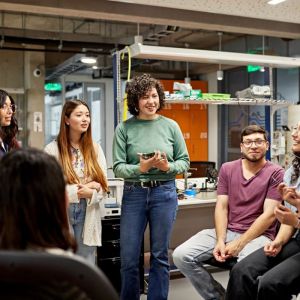
Benefits of Active Learning
Active Learning has become an integral part of higher education. As a student-centered approach to teaching, Active Learning emphasizes strategies that allow students to engage in collaboration and problem-solving skills. Many instructors have moved away from lecture as the primary teaching method, realizing the significant benefits of getting students actively engaged in the learning process.
The myriad benefits include:
Improved retention and understanding: As students actively engage with the course material, they are more likely to remember and internalize the information compared to passive listening or reading.
Enhanced critical thinking skills: Active learning promotes critical thinking skills, as students are encouraged to analyze, evaluate, and synthesize information. This helps students develop higher-order cognitive skills that are essential for success in the real world, such as problem-solving, decision-making, and creative thinking.
Increased student engagement: When students participate in discussions, group activities, or hands-on exercises, they are more likely to be interested and invested in the material, leading to a more positive learning experience.
Development of collaboration and communication skills: Many active learning techniques involve collaborative activities, such as group discussions, team projects, or peer teaching. These activities help students develop effective communication skills, teamwork, and the ability to work with diverse perspectives. These skills are valuable in academic and professional settings after graduation.
Real-world application of knowledge: Active learning often involves applying course material to real-world situations, which helps students see the relevance and application of what they are learning. This can lead to a deeper understanding of how the concepts they are studying are applied in real-life scenarios, making the learning more meaningful and practical.

Barriers to Active Learning
Active learning is often met with various misconceptions that can pose barriers for professors looking to integrate these strategies into their teaching practices. Let’s discuss some of these common misconceptions.
- Belief that active learning implies abandoning traditional lectures. While active learning emphasizes student engagement and participation, it does not negate the value of well-structured lectures. In fact, active learning can complement lectures by providing essential content and context, creating a balanced and effective learning experience.
- Equating active learning solely with collaboration. Active learning encompasses a range of strategies that encourage students to actively engage with the material, whether individually or in groups. This misconception may lead some professors to overlook valuable active learning methods that can be implemented in various instructional settings.
- Time required to implement active learning strategies. Some educators perceive implementing active learning strategies as a time-consuming process that may interfere with content coverage. However, with proper planning and integration, the strategies can enhance the efficiency of classroom instruction and promote deeper understanding among students.
- Lack of familiarity with active learning techniques. This barrier can be addressed through professional development opportunities, such as webinars, workshops, and consultations that help instructors gain confidence and expertise in incorporating active learning into their teaching repertoire.
- Mitigating student resistance. Professors can clarify the benefits of active learning, addressing concerns and demonstrating its positive impact on student learning outcomes. Creating a supportive and inclusive learning environment can also help overcome resistance and foster a culture of active engagement in the classroom.
Resources
SLU Webinars
Other Resources
- Why Undergraduate Students (and Faculty) struggle with Active Learning (To access the recording, you will need a free educator account to Harvard Business Publishing website.
- Active Learning | Center for Teaching Innovation (cornell.edu)


